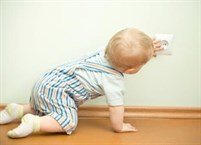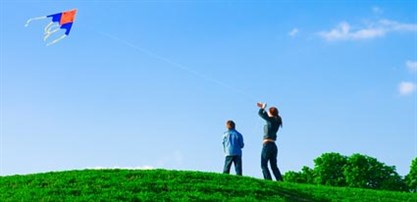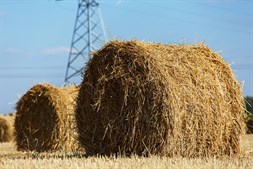
Keep Safety in Mind During Harvest
- Look up, look out and look around. Be aware of overhead power lines at all times. If you must move equipment under a line, have someone watching to ensure an electrical contact doesn’t occur.
- Don’t stack hay or round bales near electrical lines to avoid electrical contact with hay loaders or other moving equipment.
- Always lower grain augers when moving from bin to bin.
- Be aware of the location of down guywires and anchors on overhead power lines.
- When moving farm equipment, know the loaded height of trucks and equipment so contact isn’t made with overhead power lines on roads and around field entrances.
Indoor Electric Safety
Electricity travels in a path called a circuit. Your house is part of a circuit that begins at a power plant. When you flick a switch to turn on a light or start an appliance, you complete the circuit.
Electricity will not leave the circuit unless it can find an easier path to the ground. If you touch an energized wire or faulty appliance while you are grounded, the electricity will pass through you to the ground, causing a shock that can be fatal. Following a few simple safety rules can prevent injury:
- Check outlets and extension cords to make sure they aren't overloaded.
- Examine electrical cords to make sure they aren't frayed, damaged or placed under rugs or carpets.
- Make sure the proper wattage light bulbs are being used in light fixtures.
Appliances
- Keep all electrical products and cords away from water. Consider installing ground fault circuit interrupters on outlets near water. Never reach into water to get an appliance that has fallen in without first unplugging the appliance.
- To avoid electric shock or damage to sensitive electronic equipment during a storm, unplug appliances before the storm hits, or install surge protection equipment.
- Test smoke detectors periodically.
Children
- Put safety covers on all wall outlets.
- Keep electrical cords out of reach and out of sight to avoid children or pets.
Fuses and Circuit Breakers
- Never replace a fuse or circuit breaker with one that exceeds the amperage rating for a given circuit.
- Avoid using several high-amperage appliances, such as microwaves, toasters, irons or other heat-producing appliances, on the same circuit.
Power Tools
- Use power tools outdoors only in dry weather. Stand on dry surfaces and use only dry materials.
- Tools should be properly grounded wherever you use them. Consider purchasing a ground fault circuit interrupter.
- Be sure all cords and plugs are in good condition.
Safety Outdoors
- When working with a metal ladder, watch where the ladder's top end goes. Position and move the ladder carefully, making sure that it is set securely away from power lines.
- Don't climb any tree or let children climb any tree that has power lines in or near it.
- Contact OPPD if there is a potential for power lines and trees getting tangled. Contact Forestry or call 402-536-4131, or outside the metropolitan area, toll-free 877-536-4131.
- For outdoor lighting and wiring, use only weather-proofed fixtures. Outside wiring and outlets should have special protection against moisture.
- Call Nebraska811 to locate all underground utility lines before you begin a project.
- Never approach a downed power
line. Always assume it’s energized
and notify OPPD immediately.
Do's and Don'ts of Kite Flying
- Never fly your kite near power line
- If your kite gets caught in a power line, don't touch the line or the kite. Call OPPD and make sure nobody gets near the area until help arrives.
- Never fly your kite in stormy weather. A kite can make you a very tall lightning rod.
- Never use metallic flying line
- Be mindful of others. Be especially aware of other people, coolers, chairs, and fences.
- Don't fly noisy kites that disturb others.
- Never scare animals, especially horses with riders.
- Don't fly your kite near or over other people. Some fighting kites can reach speeds of 80 mph, so if they hit someone, a serious injury could result.
- Don't fly your kite near trees, roads or vehicles.
- Don't overpower yourself with a kite too big for the wind conditions.


